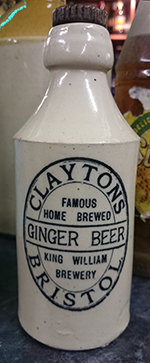
Image courtesy Aled Rees.
Potter: ? White glaze.
An early reference o the King William the Fourth public house comes from the Bristol Times and Mirror - Saturday 30 November 1839 page 4: A report from the Court for Insolvent Debtors at the Guildhall the previous Saturday..."George Barry, of the William the Fourth, public-house, St Philip’s, was opposed Mr. Smith on behalf Messrs. Tilley, brewers. The insolvent was supported by Mr. Stone. The insolvent, it appeared, had made over the whole of his property by a bill of sale to a .Mr. Tucker, whose claim, he affirmed, had been discharged ; he afterwards gave a bill sale to a Mr. Morris who took possession and sold under it; the insolvent at the time was indebted to Messrs. Tilley to the amount £73. 19s. 6d.; he afterwards made over his licence to his mother, who is now in possession. A long investigation took place with reference to the licence; it was ultimately arranged that the house and license '' should be given up for the benefit of the creditors, the insolvent's’s mother-in-law to receive back £6. 15s. which she had recently paid for a new licence; when this was done the insolvent to be discharged."
Edward Stretton was born in Bristol in 1812, baptised at St. Nicholas on 2 Feb. 1812, son of William Stretton and Sarah Crook. He married Arabella Bateman at St. Mary-le-Port on 1 Sept. 1836. They were both of the parish of Bedminster. In 1837 Edward was a Shipwright living at Jubilee Place, by 1840-1841 he was a victualler at the Duke of York Tavern there. By 1843 he was a victualler at Baptist Mills.
From the Bristol Times and Mirror - Saturday 18 September 1847 page 3: "Deaths— Sept. 9th aged 41, Arabella, the beloved wife of Mr. Edward Stretton. of the William the Fourth Inn, Dings, St. Philip's.
Edward married his second wife Jane Huish, third daughter of Mr. J. Huish, at Holy Trinity, St. Philips, on 13 Feb. 1849. He was licensee of the King William IV tavern in Folly Lane from around 1848.
From the Bristol Mercury - Saturday 05 March 1864 page 3: "IMPORTANT TO BREWERS. At the Council-house, on Tuesday, Mr. Edward Stretton, brewer, Folly-lane, St. Philip's, was summoned before Messrs. J. Fisher and R. G. Barrow, on an information that he, on the 10th of December, 1863, at his brewery, altered a certain entry theretofore made by him, as brewer of beer, purporting to be made on the 9th of December, 1863, and stating that he intended to mash 2 quarters and 2 bushels of malt on the morning of December 10th; and that he altered the entry to l quarters 4 bushels of malt, whereby he had incurred a penalty of £200. A second count in the information charged the defendant with obliterating the entry made by him on the 9th of December, whereby he had forfeited another sum of £200. Mr. Stanley (of the firm of Messrs. Stanley and Wasbrongh) appeared to prosecute, and Mr. Pigeon represented the defendant. By consent of the excise authorities the second count was withdrawn, and Mr. Pigeon said that to the first count the defendant pleaded guilty, but there were circumstances which could be mentioned to the bench to induce them to reduce the penalty to the lowest possible sum. It was necessary that an entry should be made in a paper the day before any quantity of malt was wetted, and the brewer of the defendant received his instructions from him to brew ale on Tuesday, Wednesday, and Thursday, and beer on Friday. The defendant thought that his brewer would obey his instructions, and made an entry in his paper to the effect that a certain quantity of malt was used, On Thursday afternoon the brewer came and said that he had orders for a quantity of grains that had been brewed that day. The defendant told him that he could not have the quantity which he wanted, as he had been brewing ale, The brewer then said that he thought the defendant told him to brew beer, which at once alarmed the defendant, who told him that be did not, and he must increase the entry of the amount of malt; and it was for that alteration he had been summoned. The magistrates said that under the circumstances they were inclined to mitigate the penalty to £50. Mr. Pigeon then asked that they would recommend the Board of Inland Revenue to further mitigate the penalty, but Mr. Barrow said it required some consideration before they did that. The collector, who was in court, remarked that there were circumstances in the case which he was certain would not induce the board to make any further mitigation. The parties then left the court."
From the Western Daily Press - Monday 02 November 1868 page 3: "Destructive Fire in St Philips. Saturday morning, about 1 o'clock, a fire of a most destructive character broke out in the brewery known as the King William Brewery in the occupation of Mr Stretton, situate at the corner of Cumberland and Sussex Streets, St. Philip's. The brewery had been in full work as usual yesterday, and, as was their custom, the men banked down the fires and left everything apparently all safe. Mr Stretton, who resides next door, retired to rest at about half past eleven o'clock, without discovering that anything was the matter. Between twelve and one o'clock Mr Inspector Woollacot passed the premises but failed to discover anything amiss. As soon as the flames were observed Mr Stretton was aroused,the fire brigades were sent for, and the poor people, whose dwellings surround the works, commenced removing their furniture. Meanwhile the flames spread rapidly, and the whole building, three stories high, was soon one huge mass of fire. Shortly after the arrival of the brigades the roof fell in with a tremendous crash, and the flames shot high up into the air, illuminating the whole of the city with their lurid glare, whilst myriads of sparks floated off in the morning breeze. The fire is supposed to have originated in one of the places to which some woodwork must have been attached. The whole of that part of the building which the fire originated is now only a heap of smouldering ruins. Had it not been for the exertions of the firemen, aided by good supply of water, the adjoining premises, which contained large quantity of valuable hops, malt, &c, must also have been destroyed. The damage will amount to several hundred pounds, but we are glad to hear that Mr Stretton is insured in the County and Atlas Fire Offices to the full amount. Chief Superintendent Handcock, Inspector Woollacot, and large body of police were present and rendered very material assistance."
Edward Stretton managed to recover from the fire and rebuild the brewery but he had retired by 1869. Henry Winter took the license for the King William IV on 11 October 1869— and the Brewer was Henry Hornsby Wright in 1871. Henry H. Wright, who by 1875 was a Brewer's Traveller for Thomas Allen of the Imperial Brewery, North Street, received 8 months imprisonment with hard labour at the end of March that year for embezzling money from his master.
Henry Winter was born in Bishop's Waltham, Hampshire, about 1824, he was a widower when he married Mary Ann Horsington in Bedminster on 29 Sept. 1869. A son was born to Sergt. Henry Winter and Mary Ann at the Brewery on 10 Nov. 1871. On 28 June 1877 at the King William, Folly Lane. St Philip's, after a short and painful illness, Mary Ann, wife Henry Winter, died in her 47th year.
From the Western Daily Press - Monday 2 March 1868 page 2: "Fashionable Wedding.—On Saturday last the town of Chippenham was thrown into great excitement over the nuptials of Mr Richard Jones, of Clifton, and Clementina Rebecca, only daughter of Mr C. J. Dowding, Mayor of Chippenham. The ceremony was performed by the Rev. John Rich, vicar. The bride, who was given away by her father, was elegantly attired in white moire, wreath of orange blossoms, with tulle veil beautifully embrodered with silver, and attended by the following bridesmaids :—Miss E. Lloyd (Badminton), Miss J. Holmes (Bath), Miss Nicholls and Miss Viveash (Chippenham), who wore white grenadine dresses trimmed with scarlet, wreaths of roses, and tulle veils. The bridegroom was accompanied by Messrs Fred, and Frank Dowding (brothers of the bride), Mr E. Jones (brother of the bridegroom), Mr Lloyd, and large circle of friends. The breakfast, which was of a very recherche description, was laid out at Albion Villa, the residence of the Mayor. Amongst the company were the Mayor and Mayoress, Rev. J. Rich, Mrs Lowe, Mr Lloyd, Miss Nicholls, Mr Holmes, Miss Lloyd, Mr Lowe, Mrs Brotherhood, Mr Fred. Dowding, Miss Calcott, Mr E. Jones, Miss Holmes, Mr Frank Dowding, Miss Viveash, Mr J. J. Calcott, Mrs Huff, &c. After the usual toasts the happy pair left for Southsea, en route for the Isle of Wight. The presents, which were arranged in the drawing-room, were very numerous, and of an elegant and costly description." Richard Jones subsequently went into partnership with Frederick W. Dowding of Chippenham at the King William Brewery.
Richard Jones was born in Brislington in 1822, baptised privately at St. Luke, Brislington son of grocer Isaac Jones and wife Sarah. In the census, Richard was somewhat erratic about his age. He appears age 15 in the 1841 census, living with his parents and family in Brislington. His age is accurate in the 1861 census when he is an accountant at 15 Park Place, Clifton, age 39, living with 50 year old wife Sarah Ann. Richard had married widow Sarah Ann Cross, daughter of accountant James Matthews, at St. Mary-le-Port, Bristol, on 15 Feb. 1853.
From the London Gazette, 8 October 1880: "NOTICE is hereby given, that the Partnership heretofore subsisting between us the undersigned, Richard Jones and Frederick William Dowding, carrying on business in the city of Bristol, as Brewers, under the style or firm of Jones and Dowding, has been dissolved, as from the 29th day of September, 1880, by mutual consent. All debts due to and owing from the said partnership will be received and paid by the said Richard Jones, by whom the business will be carried on. —Dated this 6th day of October,1880. Richard Jones. Fredk. W. Dowding."
The Will of Edward Stretton, formerly of Tivy Villa but late of Devonshire Villa, both in Somerville Road, Bishopston in the parish of Horfield, in the County of Gloucestershire, Gentleman, who died 4 May 1881 at Devonshire Villa was proved at Bristol by Jane Stretton, Widow, the Relict, and Jane Huish Stretton, Daughter, both of Devonshire Villa, two of the Executors. The family retained ownership of the estate which was let to other parties.
From the Bristol Mercury - Thursday 26 February 1891 page 1: "THIS DAY, TO BREWERS, MALTSTERS, MANUFACTURERS AND OTHERS. SALE of an Established LEASEHOLD STEAM BREWERY, with the FREEHOLD FULLY-LICENSED KING WILLIAM TAVERN adjoining: TWO MALT HOUSE5, COTTAGES, YARDS and PREMISES situate in FOLLY LANE and SUSSEX STREET, ST. PHILIP'S, Bristol. ALEXANDER, DANlEL, SELFE, & CO. will SELL by AUCTION, at the BANK AUCTION MART, CORN STREET, Bristol, THIS DAY (THURSDAY), 26th February, punctually at Three o'clock, The Valuable, Well-known and Conveniently-arranged STEAM BREWERY, With Capital Cellarage and Stores, Two Malt Houses of l2½ Quarters each, Offices, Cottages, Stable, Yards, Workshops, and Premises; also the Double-Licensed House adjoining, known as the KING WILLIAM TAVERN (see Bristol's Lost Pubs - William IV), Situate in FOLLY LANE and SUSSEX STREET, ST. PHILIP'S, Bristol. The Brewery was for many years conducted (until his retirement from business) by the late Mr Stretton, to whose estate the property still belongs, then by Messrs Jones and Dowding, at a rental of £225 a year; and subsequently, until his recent decease, by Mr Richard Jones, at the reduced and totally inadequate rent of £180 per Year, The King William Tavern comprises—Bar, long taproom, two kitchens, and w.c.; large clubroom, four bedrooms, good cellar, and minor offices; and the lease upon which it is now held terminates on the 25th March, 1891, The leasehold portion of the Premises comprises the Sussex Street Brewery, St. Philip's, held for the residue of a term of 1010 years, from the 29th September, 1856, at the yearly rent of £10; also all those Freehold Premises known as the King William IV, and the Two Messuages adjoining, situate in Folly Lane, St. Philip's aforesaid, subject to an annual rent of £ 24. The representative of the late lessee are prepared to render possession on the 25th March next, if required. The Property is situated in the midst of a densely populated manufacturing neighbourhood, and may be very easily converted to general manufacturing purposes, workshops, artisans' dwellings, etc. Further particulars may be obtained of the Auctioneers, Corn Street, Bristol (and 84, Old Jewry, London. E.C.): of Messrs BRAMBLE & WATTS, Solicitors, City Chambers, Nicholas Street, Bristol: or of Mr JOHN CUMBERLAND, Solicitor, 5, Clare Street, Bristol."
Simeon Clayton was born in Little Missenden, Buckinghamshire, on 27 March 1835, baptised at Amersham Baprtist Meeting in 1836, son of John Clayton and Charlotte Burch. He married Eliza Rickett of Boxmoor, Herts. at Leverstock Green, Herts. on 15 October 1855. By 1861, Simeon was a card maker at 2 Elizabeth Terrace, Hemel Hempstead, and the couple had sons John age 5, Charles William James age 3, & Montague James age 9 months. There followed Walter Samuel in 1862, daughter Emma in 1865, and sons George Simeon in 1867, and Arthur in 1870. In 1871 Simeon was a bookseller at Sotheron Road, Watford. By 1872 the family had moved to Barrow in Furness, Lancashire where children Frederick Septimus (1872), Lillian (1875), and Thomas Henry (1877) were born. But by 1880 they had moved again to Matlock Villa, Derby Road, Horninglow, Burton-on-Trent, where Simeon had become a brewer of non-intoxicating beer as Clayton & Co., Brewers, Horningslow Road. By 1891, Simeon and Eliza had returned to Brays lane, Amersham, Bucks. The Bow "Penarth" brewery had opened around 1886 and this is likely when Simeon returned. By now the brewing business of Simeon Clayton & Sons was in full swing. By 1895 branches had opened in Bristol and Cardiff. Simeon Clayton, from at least 1901, in his final years, moved to Tremel (not Thermal as recorded-correction sent by John Clayton), in St. Martin's on the island of Guernsey, where he died on 29 January 1910. His son George Simeon was executor of his estate. All of Simeon's sons were involved in the business at some point.
George Simeon Clayton was born on Christmas Day 1866 in Boxmoor, Herts., son of Simeon & Eliza. George was living at 124 City Road, St. Paul's, Bristol, when he married Florence Louisa Foskett, daughter of accountant Joseph Foskett, on 11 September 1895 at St. Paul's, Paddington, London. At the time of his marriage his occupation is given as Manager of a Temperance Brewery in Bristol. In fact George was the manager of the Bristol Branch of Simeon Clayton & Sons at the King William Brewery. In 1901 the family were living at 35, Belmont Road, Ashley, with children George Stanley and Florence May Clayton. Another daughter, Lucie Foskett Clayton was born at Bernardsville, New Jersey, U.S.A. on 24 Aug. 1910. George is listed as a Manager of a Mineral Water Manufacturers in the 1901 census. After the Bristol factory closed in 1907, George and family moved to 22 Ceylon Road, Westcliff-on-Sea, Essex, where George was a manufacturing engineer at St. Anne's Works, St. Anne Street, Limehouse, London by 1911. By 1939 George and Florence were at the Dormy Hotel, Ferndown, Bournmouth (Destroyed by fire in 2007). George, at this time, was a director of an engineering co. specialising in dairy and bottling. George Simeon Clayton, of 106 Warwick Park, Tunbridge Wells, died on 11 May 1944 at the Bideford & District Hospital, Devon.
From the Western Daily Press - Monday 19 August 1895 page 3: "Outing—On Wednesday the employees of Simeon Clayton and Sons, New Era Brewery, St. Philip's, together with the Cardiff branch, had their outing to Weston-super-Mare by the SS. Cambria. After partaking of dinner, games of football and cricket were played, the team from Bristol winning."
On 1 Sept. 1897 the South Wales Echo gives notice that the Cardiff branch of S. Clayton & Sons, brewers of non-intoxicating, "New-Era" Beverages, Manufacturers of Mineral Waters, Fruit Wines, and Cordials, had been transferred to Claytons (Cardiff) Limited, registered offices 23 Penarth Road, Cardiff. In 1904 Charles Haskins was manager of the Claytons (Cardiff) Limited branch.
From the Morning Post - Monday 25 January 1904 page 2: "At the High Court of Justice, Chancery Division...(Before Mr. Justice Byrne.) INJUNCTION GRANTED. SCHWEPPES (LIMITED) v. CLAYTONS (CARDIFF) (LIMITED). Mr. Sebastian appeared for the plaintiff company in this action, and moved for judgment in default of appearance. The plaintiff company, he said,was a firm of soda-water manufacturers, who brought the action to restrain Claytons (Cardiff) (Limited) and their servants and agents from in any manner passing off any soda-water not of the plaintiff company's manufacture as and for the manufactures of the plaintiff company, and from using a label colourably imitating that of the plaintiff company and calculated to represent or lead to the belief that the water sold thereunder was water of the plaintiff company’s manufacture. Counsel said that the default in appearance was really a matter of arrangement, because the defendant company had written to his clients offering not to appear or oppose in any way if the plaintiffs would waive an account and damages, and this his clients had agreed. Besides tho injunction his clients asked for delivery up or destruction of all the labels in the possession or under the control of the defendant company. His lordsbip granted the injunction and order for delivery as asked for, but slightly modified the form of it, as damages were not asked for."
From the London Gazette - 12
February 1907: "In the Matter of CLAYTONS (BRISTOL) Limited. At an
Extraordinary General Meeting of the Members of the above named Company,
duly convened, and held at 18, Ironmonger-lane, on Wednesday, the 6th day
of February, 1907, the following Extraordinary Resolution was duly
passed:—'"That it has been proved to the satisfaction of the Company that
it cannot, by reason of its liabilities, continue its business, and that
it is advisable to wind up the same, and that the same be wound up
accordingly; and that Mr. Angus Newton Scott, Chartered Accountant, of 18,
Ironmonger-lane, in the city of London, be and is hereby appointed
Liquidator to conduct the winding up, with power to carry on the business
for that purpose." February 8th, 1907. GEO. S.
CLAYTON, Chairman."
From the Western Daily Press -
Saturday 18 May 1907 page 1: "CLAYTONS (BRISTOL). LTD. In Voluntary
Liquidation. BY ORDER OF THE LIQUIDATOR. KING WILLIAM BREWERY, SUSSEX
STREET, ST. PHILIP’S, BRISTOL. TO MINERAL WATER MANUFACTURERS, BREWERS,
ENGINEERS & OTHERS. MR JOHN SULLEY is instructed to SELL by AUCTION,
on the Premises, as above, on THURSDAY Next. May 23rd. at Two o'clock
prompt, the GOODWILL OF THE BUSINESS, Together with the Mineral Water and
Gingerbeer Brewing Plant, consisting of Steam Jacketted Copper Brewing
Pan, Cooling Machine, Carbonating and Bottling Machines by well-known
makers S-h.p. National Gas Engine, Vertical Boiler, Filters,
Bottle-washing Machines, Brewing Vats, 1,500 dz. Codd's and other
Bottles,1,000 Bottle Boxes, 150 4½. 9. and 12-Gallon Casks, Jars, Cases,
&c.; three Useful Trollies, two Carts, three Horses, Harness, and
other Trade Utensils.
On View Morning of Sale. Further Particulars. Conditions of Sale, and
Catalogues from the Liquidator and Solicitor, as in above advertisement;
and at the Auctioneer 's Offices, 46, Cannon Street, London, E.C."
From the Western Mail - Tuesday 20 August 1918 page 2: "BASKER & ELLIOTT (LTD.), 67, Penarth-road, Cardiff, hereby give notice that they have purchased all Bottles, Syphons, Stoppers, and Boxes bearing the name of CLAYTONS (CARDIFF), LIMITED, or the registered mark KIZLA."
From the Western Daily Press - Thursday 22 October 1931 page 1: "THIS DAY. ST. PHILIP'S, BRISTOL. MR A. VICTOR OSMOND will SELL by AUCTION, at the FULL MOON HOTEL, NORTH STREET, STOKES CROFT, TODAY (THURSDAY), 22nd October, 1931, at Seven o'clock: Lot 1.—VACANT POSSESSION— The Extensive FACTORY PREMISES, Situate at the corner of SUSSEX STREET and FOLLY LANE, ST. PHILIP'S, lately occupied by W. H. COWARD & CO., formerly known the King William Brewery. Lot 2.-Three DWELLING-HOUSES, known as Nos. 45, 46, and 47, FOLLY LANE (adjoining Lot 1). Lot 3.-Eight DWELLING-HOUSES, Nos. 48 to 55, FOLLY LANE (adjoining Lots 1 and 2). Further particulars of Auctioneer, 15, Bridge Street; or of Messrs BEVAN, HANCOCK and CO.. Solicitors, Carlton Chambers, 25, Baldwin Street, Bristol."
| Stoneware Ginger Beer Bottle |  |
| Printed (in circle): CLAYTONS /
BRISTOL (in centre) FAMOUS / HOME BREWED / GINGER BEER / KING
WILLIAM / BREWERY Image courtesy Aled Rees. Potter: ? White glaze. |
| 10oz
Codd's Bottle |
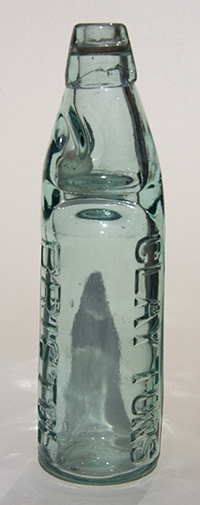 |
| Embossed:
(Lengthwise) CLAYTONS / BRISTOL Glassworks: Unmarked, 3175 on base. Height: 22.5cm. |
| Half Pint Beer Bottle |
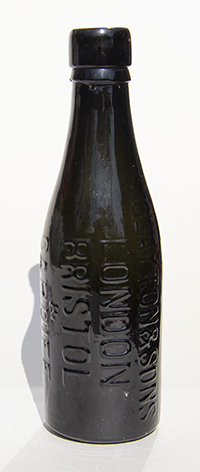 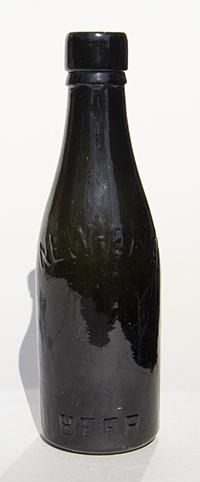 |
| Embossed: (Front,
lengthwise) S CLAYTON & SONS / LONDON / BRISTOL / & /
CARDIFF (back) "NEW-ERA" / BEER Glassworks: unmarked. Height: 21cm. |
| 10oz Codd's
Bottle |
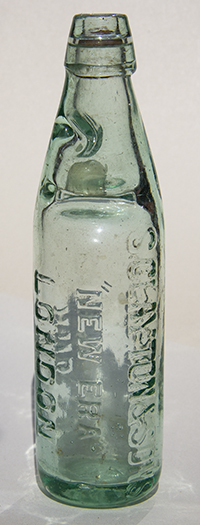 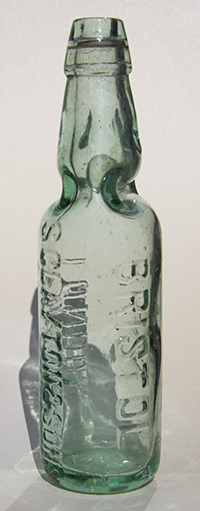 |
| Embossed: (Front,
lengthwise) S CLAYTON & SONS / "NEW-ERA" / LONDON /
(back lengthwise) AND / BRISTOL Glassworks: unmarked, "NEW-ERA" on base. Height: 24cm. |
| Pint
Beer/Lemonade Bottle |
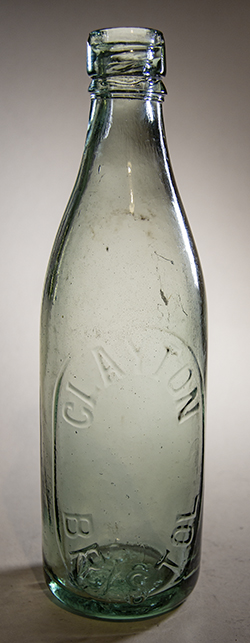 |
| Embossed:
CLAYTON / BRISTOL Glassworks: J. L. & Co., C, 1781 on base. (John Lumb & Co., Castleford). Height: 25.5cm. |